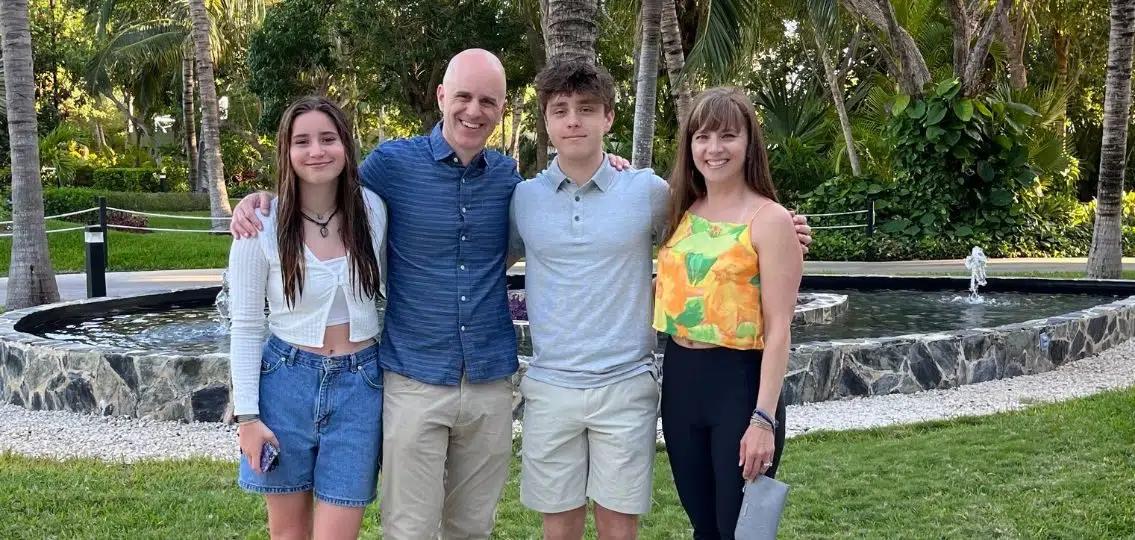Every summer, our town hosts an arts festival. Children’s Day always kicks off the event. When my kids were young, I took them downtown to get their faces painted, browse the children’s sale, and find some shade to enjoy our lemonade and kettle corn. I remember feeling hot and frustrated by toddler irritability, their sticky fingers tugging my shirt, and their whiny voices begging for more of this or that. But what prevails in my memory is the smiling, the hand-holding, and the exuberant joy found in running through mist on Allen Street. Those moments have become golden snapshots of togetherness. And now, as I brace for the shock of an empty nest, I am missing the very things that, in earlier years, caused me stress.
I should plan to spend more time with my wife (I am) and find some new hobbies (I will), but when I imagine our house without the slamming doors, teenage laughter, silly bickering, and the late-afternoon questions shouted from upstairs (What’s for dinner? Where’s my sweatshirt?), I get an icy feeling in my gut. When the kids were young and needed me every moment, I craved the kind of silence I’m about to experience. But, now that it’s near, I’m not ready for it. I don’t want it just yet.
The Life of a Pre-Empty Nest Dad
Sometimes it feels like their independence happened all at once, even though evidence shows it was gradual. The early years were a blur of exhaustion; I didn’t sleep much until my kids entered kindergarten. We read together every night. I can still feel my son’s little elbow in my side, nudging me to stay awake until I finished reading Where The Wild Things Are. Throughout elementary school, they wanted me nearby to play soccer in the yard and hold puppet shows in the living room. By middle school, they wanted rides to friends’ houses and begged for sleepovers. I was still needed, and being a dad still took time, but my usefulness was changing. We weren’t building block towers or holding matchbox car competitions together. We were beginning the slow process of separation, of independence.
And then high school happened. Although both of my kids pull away differently, they both ask for space. My son stays longer at the field after practice. My daughter goes to back-to-back sleepovers that turn into days-long excursions from home. This is natural, I tell myself. This is what should be happening. But high school is a tricky time. Just when I give them a wide berth, they page me for important conversations about friend issues or teacher conflicts. Now, especially, I do my best to listen hard. I let everything else wash away. I put my phone down, turn off the TV, position my body toward them, and just listen. It’s very clear to me that my in-home parenting days are numbered with my busy teens. I want to be as present as possible for what I have left.
I often hear parents talk about all the traveling they’ll do after their kids leave home. They’re excited about the regained freedom and independence that comes with an empty nest. Right now, however, I’m feeling a sense of loss. I already miss helping to set up matchbox car races, turning my living room into a puppet show theater, and falling asleep with them on the floor. I miss my kids, the ridiculous TV shows and listening to repetitive music that worms its way into my brain for days. I know those days were stressful. I know I complained. I won’t lie, sometimes I longed for my kids to be older; old enough to take care of themselves. Oh, how that longing changes now that I’m on the precipice of losing them to adulthood.
This year, there’s no reason for me to go to Children’s Day. Both of my teens are working. I sit at home, having major feelings of missing out. But then I think of my nieces and nephews. They’re still young. They still want to get their faces painted and wait in line for mammoth cups of lemonade!
I text my brothers and ask if they want some company. I’m anxiously awaiting their response.




